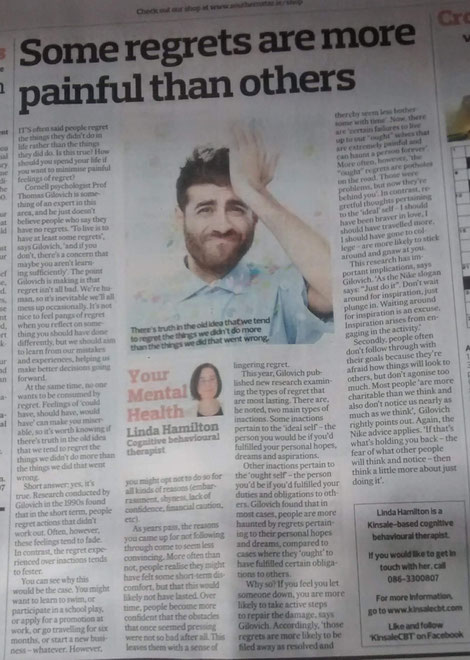
In last week's Southern Star, I offered some advice on how to minimise painful feelings of regret. The column is reproduced below.
It’s often said people regret the things they didn’t do in life rather than the things they did do. Is this true? How should you spend your life if you want to minimise painful feelings of regret?
Cornell psychologist Prof Thomas Gilovich is something of an expert in this area, and he just doesn’t believe people who say they have no regrets. ‘To live is to have at least some regrets’, says Gilovich, ‘and if you don’t, there’s a concern that maybe you aren’t learning sufficiently’. The point Gilovich is making is that regret isn’t all bad. We’re human, so it’s inevitable we’ll all mess up occasionally. It’s not nice to feel pangs of regret when you reflect on something you should have done differently, but we should aim to learn from our mistakes and experiences, helping us make better decisions going forward.
At the same time, no one wants to be consumed by regret. Feelings of “could have, should have, would have” can make you miserable, so it’s worth knowing if there’s truth in the old idea that we tend to regret the things we didn’t do more than the things we did that went wrong.
Short answer: yes, it’s true. Research conducted by Gilovich in the 1990s found that in the short term, people regret actions that didn’t work out. Often, however, these feelings tend to fade. In contrast, the regret experienced over inactions tends to fester (continued below...)
FEARS
You can see why this would be the case. You might want to learn to swim, or participate in a school play, or apply for a promotion at work, or go travelling for six months, or start a new business – whatever. However, you might opt not to do so for all kinds of reasons (embarrassment, shyness, lack of confidence, financial caution, etc). As years pass, the reasons you came up for not following through come to seem less convincing. More often than not, people realise they might have felt some short-term discomfort, but that this would likely not have lasted. Over time, people become more confident that the obstacles that once seemed pressing were not so bad after all. This leaves them with a sense of lingering regret.
This year, Gilovich published new research examining the types of regret that are most lasting. There are, he noted, two main types of inactions. Some inactions pertain to the ‘ideal self’ – the person you would be if you’d fulfilled your personal hopes, dreams and aspirations. Other inactions pertain to the ‘ought self’ – the person you’d be if you’d fulfilled your duties and obligations to others. Gilovich found that in most cases, people are more haunted by regrets pertaining to their personal hopes and dreams, compared to cases where they ‘ought’ to have fulfilled certain obligations to others.
Why so? If you feel you let someone down, you are more likely to take active steps to repair the damage, says Gilovich. Accordingly, ‘those regrets are more likely to be filed away as resolved and thereby seem less bothersome with time’. Now, there are ‘certain failures to live up to our “ought” selves that are extremely painful and can haunt a person forever’. More often, however, 'the "ought" regrets are potholes on the road. Those were problems, but now they’re behind you’. In contrast, regretful thoughts pertaining to the ‘ideal’ self – I should have been braver in love, I should have travelled more, I should have gone to college – are more likely to stick around and gnaw at you.
'JUST DO IT'
This research has important implications, says Gilovich. ‘As the Nike slogan says: “Just do it”. Don’t wait around for inspiration, just plunge in. Waiting around for inspiration is an excuse. Inspiration arises from engaging in the activity.’
Secondly, people often don’t follow through with their goals because they’re afraid how things will look to others, but don’t agonise too much. Most people ‘are more charitable than we think and also don’t notice us nearly as much as we think’, Gilovich rightly points out. Again, the Nike advice applies. ‘If that’s what’s holding you back – the fear of what other people will think and notice – then think a little more about just doing it’.